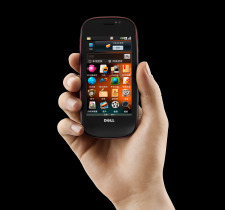 Now that it's finally been launched in at least some parts of the world today, Dell is working to keep its new Mini 3 smartphone device closely associated with Dell's computers, calling it "The world's most compact Dell" directly on its packaging.
Now that it's finally been launched in at least some parts of the world today, Dell is working to keep its new Mini 3 smartphone device closely associated with Dell's computers, calling it "The world's most compact Dell" directly on its packaging.
"Our entry into the smartphone category is a logical extension of Dell's consumer product evolution over the past two years," Ron Garriques, President of Dell Global Consumer Group said in a prepared statement today. "We are developing smaller and smarter mobile products that enable our customers to take their Internet experience out of the home and do the things they want to do whenever and wherever they want."
This is a wise marketing decision by Dell, as its brand is associated with fully powered computers and not mobile phones. So this approach makes it appear as if Dell isn't trying something radically different, it's just shrinking what it has already perfected into a small package.
Further, the mental link consumers draw to computers can be beneficial when marketing "smart" devices.
The Dell Mini 3 is a 3.5" capacitive touchscreen device, and will be first available in China and Brazil. Dell has shown off the device in a number of places this year, but has stayed mostly silent about it in the English speaking world.
Today, the company confirmed the Mini 3's release, but added it will announce with each carrier individually.
In China, Dell's Mini 3 is one of China Mobile's first "OPhones," a line of smartphones running a custom Android build called Open Mobile System (OMS). Though it will be available to the largest mobile subscriber base in the world (China Mobile has 500 million customers), it is rumored to be without 3G connectivity.
Before the end of the year, America Movil subsidiary Claro will bring the Dell Mini 3 to Brazil. That version will also be Android-based, but it will have a different interface from China Mobile's and it will also support 3G.
This is only the first of many announcements about mobile devices expected to come from Dell. The company has contracts to bring its new smartphones to Vodafone in Europe, Australia, and New Zealand, AT&T and Verizon in the US, M1 and Starhub in Singapore, and Maxis in Malaysia. Dates and details of each launch remain undisclosed.
We reached out to Dell today to ask just how much consumers outside of China and Brazil should pay attention to such launches. A spokesman for the company reiterated that this is a global strategy, and that the launches will be up to the carriers, but also that the importance of China Mobile shouldn't be understated.
After all, the carrier's subscriber base is greater than the entire population of the United States.
Copyright Betanews, Inc. 2009








